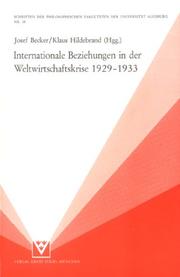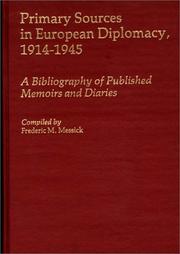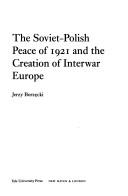| Listing 1 - 10 of 12 | << page >> |
Sort by
|

ISBN: 3920896629 9783920896625 Year: 1980 Publisher: München : Vögel,
Abstract | Keywords | Export | Availability | Bookmark
 Loading...
Loading...Choose an application
- Reference Manager
- EndNote
- RefWorks (Direct export to RefWorks)
Depressions --- Congresses --- Europe --- Foreign relations --- Congresses. --- Depressions - 1929 - Europe - Congresses --- Europe - Foreign relations - 1918-1945 - Congresses

ISBN: 031324555X 9780313245558 Year: 1987 Volume: 6 Publisher: New York : Greenwood Press,
Abstract | Keywords | Export | Availability | Bookmark
 Loading...
Loading...Choose an application
- Reference Manager
- EndNote
- RefWorks (Direct export to RefWorks)
Book
ISBN: 0049400681 9780049400689 Year: 1983 Publisher: London : George Allen & Unwin,
Abstract | Keywords | Export | Availability | Bookmark
 Loading...
Loading...Choose an application
- Reference Manager
- EndNote
- RefWorks (Direct export to RefWorks)
Fascism --- Fascisme --- World War, 1939-1945 --- World politics --- Causes --- Europe --- Foreign relations --- Politics and government --- World War, 1939-1945 - Causes --- World politics - 1933-1945 --- Europe - Foreign relations - 1918-1945 --- Europe - Politics and government - 1918-1945
Book
ISBN: 2247009077 9782247009077 Year: 1974 Publisher: Paris : Dalloz,
Abstract | Keywords | Export | Availability | Bookmark
 Loading...
Loading...Choose an application
- Reference Manager
- EndNote
- RefWorks (Direct export to RefWorks)
World politics --- Maritime law --- Europe --- Foreign relations --- Politique mondiale --- World politics - 20th century --- Maritime law - France --- Europe - Foreign relations - 1918-1945 --- Europe - Foreign relations - 1945 --- -World politics - 20th century. --- -World politics --- Relations internationales --- Histoire --- 20e siecle
Book
ISBN: 2200268173 9782200268176 Year: 2006 Publisher: Paris Colin
Abstract | Keywords | Export | Availability | Bookmark
 Loading...
Loading...Choose an application
- Reference Manager
- EndNote
- RefWorks (Direct export to RefWorks)
History of Europe --- anno 1940-1949 --- anno 1910-1919 --- anno 1930-1939 --- anno 1920-1929 --- Europe --- Politics and government --- History --- Foreign relations --- Politique et gouvernement --- Histoire --- Relations extérieures --- Relations extérieures --- Europe - Politics and government - 1918-1945 --- Europe - History - 1918-1945 --- Europe - Foreign relations - 1918-1945 --- Europe - Politique et gouvernement - 1918-1945 --- Europe - Histoire - 1918-1945 --- Europe - Relations extérieures - 1918-1945
Book
ISSN: 09442294 ISBN: 9782875743541 9783035266283 303526628X 2875743546 3035297010 Year: 2016 Volume: 96 96 Publisher: Brussels Lang
Abstract | Keywords | Export | Availability | Bookmark
 Loading...
Loading...Choose an application
- Reference Manager
- EndNote
- RefWorks (Direct export to RefWorks)
Au lendemain de la Première Guerre mondiale, la diplomatie est à réinventer. Un nouvel ordre international émerge au sein duquel juristes internationaux, journalistes, banquiers d'affaires et autres experts concurrencent désormais les diplomates de métier. De nouvelles arènes diplomatiques apparaissent, à l'instar de la Société des Nations, ancêtre des organisations multilatérales actuelles. À travers les dix études de cas présentées ici, le continent européen apparaît comme un terrain propice à l'invention de pratiques diplomatiques nouvelles tout au long du XXe siècle. Cet ouvrage collectif constitue les actes du colloque international de l'association RICHIE sur les « sociabililités, réseaux et pratiques diplomatiques en Europe de 1919 à nos jours » tenues à Bruxelles, les 20 et 21 mars 2015. After the First World War, reshaping the art of diplomacy is a necessity. International lawyers, merchant bankers, academics, journalists and senior officials became key-figures of a new International order in which the diplomats have lost their monopoly over foreign affairs. New diplomatic arenas emerged such as the League of Nations, the precursor of today's multilateral organizations. In that series of ten case studies, the European continent appears as a fertile ground where new diplomatic practices have emerged along the whole 20th century. This book brings together the edited proceedings of the RICHIE International Conference organized in Brussels on 20 and 21 March 2015, under the title «Networks, Dynamics of Socialization and Practices in European Diplomacy since 1919». «Der Sammelband bietet einen beachtlichen Einblick in die Geschichte internationaler Beziehungen im 20. Jahrhundert.» (Axel Dröber, Francia-Recensio 2017/2)
Diplomacy --- Diplomatie --- History --- Histoire --- Europe --- Foreign relations --- Congresses. --- Relations extérieures --- Congrès --- Droit international --- International relations --- Council of Europe countries --- Eastern Hemisphere --- Eurasia --- Relations extérieures --- Congrès --- Technological innovations. --- 20th century --- Congresses --- 21st century --- 1918-1945 --- 1945 --- -Congresses --- Politics and government --- 1989 --- Diplomatie. --- Diplomacy - History - 20th century - Congresses --- Diplomacy - History - 21st century - Congresses --- Europe - Foreign relations - 1918-1945 - Congresses --- Europe - Foreign relations - 1945- - Congresses
Book
ISBN: 2247019072 9782247019076 Year: 1978 Publisher: Paris Dalloz
Abstract | Keywords | Export | Availability | Bookmark
 Loading...
Loading...Choose an application
- Reference Manager
- EndNote
- RefWorks (Direct export to RefWorks)
World politics --- Politique mondiale --- Maritime law --- Europe --- Foreign relations --- -#SBIB:93H3 --- #SBIB:327.6H00 --- Colonialism --- Global politics --- International politics --- Political history --- Political science --- World history --- Eastern question --- Geopolitics --- International organization --- International relations --- Thematische geschiedenis --- Internationale en diplomatieke relaties: algemeen --- #SBIB:93H3 --- World politics - 20th century --- Maritime law - France --- Europe - Foreign relations - 1918-1945 --- Europe - Foreign relations - 1945 --- -World politics
Book
ISBN: 2247014836 9782247014835 Year: 1992 Publisher: Paris Dalloz
Abstract | Keywords | Export | Availability | Bookmark
 Loading...
Loading...Choose an application
- Reference Manager
- EndNote
- RefWorks (Direct export to RefWorks)
World history --- anno 1900-1999 --- World politics --- Politique mondiale --- Foreign relations --- Relations extérieures --- 327 <09> --- 930.9 --- #A9312A --- Geschiedenis van de internationale betrekkingen --- 327 <09> Geschiedenis van de internationale betrekkingen --- Relations extérieures --- 327 --- Maritime law --- Europe --- World politics - 20th century --- Maritime law - France --- Europe - Foreign relations - 1918-1945 --- Europe - Foreign relations - 1945 --- -World history --- -World politics --- Relations internationales --- 20e siècle
Book
ISBN: 2247006450 9782247006458 Year: 1985 Publisher: Paris Dalloz
Abstract | Keywords | Export | Availability | Bookmark
 Loading...
Loading...Choose an application
- Reference Manager
- EndNote
- RefWorks (Direct export to RefWorks)
World history --- anno 1900-1999 --- World politics --- Politique mondiale --- Europe --- Foreign relations --- Relations extérieures --- Maritime law --- -327 "1919/1984" --- 341.7 --- Colonialism --- Global politics --- International politics --- Political history --- Political science --- Eastern question --- Geopolitics --- International organization --- International relations --- Council of Europe countries --- Eastern Hemisphere --- Eurasia --- -Foreign relations --- -World history --- -World politics --- Relations extérieures --- 327 "1919/1984" --- World politics - 20th century --- Maritime law - France --- Europe - Foreign relations - 1918-1945 --- Europe - Foreign relations - 1945

ISBN: 9786612353352 0300145012 1282353357 1282088734 9786612088735 9780300145014 9781282088733 0300121210 9780300121216 9781282353350 661235335X 6612088737 Year: 2008 Publisher: New Haven : Yale University Press,
Abstract | Keywords | Export | Availability | Bookmark
 Loading...
Loading...Choose an application
- Reference Manager
- EndNote
- RefWorks (Direct export to RefWorks)
The Soviet-Polish peace treaty of 1921, also known as the "Riga peace," ended the war of 1919-1920 and may be considered the most important Eastern European treaty of the interwar period. This deeply researched book offers the first post-Soviet account of how Bolshevik Russia and Poland came to sign the treaty-a pact that established the central part of the Soviet western border and provided Eastern Europe with a measure of stability that lasted until 1939. Jerzy Borzecki draws on a wealth of untapped materials in Russian and Polish archives to recreate the negotiations and behind-the-scenes maneuvers leading to and surrounding the treaty. He examines the significance of the agreement not only to its signatories but also to Ukraine, Belarus, Lithuania, and Latvia. The Riga peace represented an authentic compromise between Poland and Bolshevik Russia, Borzecki shows, and he offers new interpretations of other crucial aspects of the negotiations as well.
Russo-Polish War, 1919-1920 --- Polish-Russian War, 1919-1920 --- Russo-Polish Campaign, 1920 --- Diplomatic history. --- Territorial questions. --- Poland. --- Poland --- Soviet Union --- Europe --- Council of Europe countries --- Eastern Hemisphere --- Eurasia --- Foreign relations --- Boundaries. --- Poland. -- Treaties, etc. -- Soviet Union, -- (1921 Mar. 18). --- Russo-Polish War, 1919-1920 -- Diplomatic history.. --- Russo-Polish War, 1919-1920 -- Territorial questions.. --- Poland -- Foreign relations -- Soviet Union.. --- Soviet Union -- Foreign relations -- Poland.. --- Europe -- Boundaries.. --- Europe -- Foreign relations -- 1918-1945.
| Listing 1 - 10 of 12 | << page >> |
Sort by
|

 Search
Search Feedback
Feedback About UniCat
About UniCat  Help
Help News
News